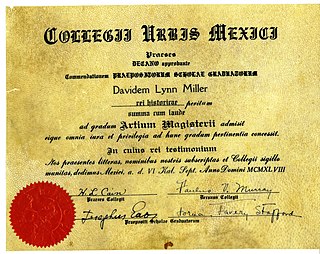An associate degree is an undergraduate degree awarded, primarily in the United States, after a course of post-secondary study lasting two or three years. It is a level of qualification between a high school diploma or GED and a bachelor's degree.
Further education in the United Kingdom and Ireland is education in addition to that received at secondary school, that is distinct from the higher education (HE) offered in universities and other academic institutions. It may be at any level in compulsory secondary education, from entry to higher level qualifications such as awards, certificates, diplomas and other vocational, competency-based qualifications through awarding organisations including City and Guilds, Edexcel (BTEC) and OCR. FE colleges may also offer HE qualifications such as HNC, HND, Foundation Degree or PGCE. The colleges are also a large provider of apprenticeships, where most of the training takes place in the apprentices' workplace with some day release into college.

A diploma is a certificate or deed issued by an educational institution, such as college or university, that testifies that the recipient has successfully completed a particular course of study. The word diploma also refers to an academic award which is given after the completion of study in different courses such as diploma in higher education, diploma in graduation or diploma in post graduation etc. Historically, it can also refer to a charter or official document, thus diplomatic, diplomat and diplomacy via the Codex Juris Gentium Diplomaticus.
A graduate diploma is generally a qualification taken after completion of a first degree, although the level of study varies in different countries from being at the same level as the final year of a bachelor's degree to being at a level between a master's degree and a doctorate. In some countries the graduate diploma and postgraduate diploma are synonymous, while in others the postgraduate diploma is a higher qualification.
Higher education in Mauritius includes colleges, universities and other technical institutions. The sector is managed by the Tertiary Education Commission (TEC) which has the responsibility for allocating public funds, and fostering, planning and coordinating the development of post-secondary education and training.

A vocational school, sometimes also called a trade school, career center, or vocational college, is a type of educational institution, which, depending on the country, may refer to secondary or post-secondary education designed to provide vocational education, or technical skills required to perform the tasks of a particular and specific job. In the case of secondary education, these schools differ from academic high schools which usually prepare students who aim to pursue tertiary education, rather than enter directly into the workforce. With regard to post-secondary education, vocational schools are traditionally distinguished from four-year colleges by their focus on job-specific training to students who are typically bound for one of the skilled trades, rather than providing academic training for students pursuing careers in a professional discipline. While many schools have largely adhered to this convention, the purely vocational focus of other trade schools began to shift in the 1990s "toward a broader preparation that develops the academic" as well as technical skills of their students.

The Australian Qualifications Framework (AQF) specifies the standards for educational qualifications in Australia. It is administered nationally by the Australian Government's Department of Industry, with oversight from the States and Territories, through the Standing Council of Tertiary Education Skills and Employment. While the AQF specifies the standards, education and training organisations are authorised by accrediting authorities to issue a qualification.

Education in Mauritius is managed by the Ministry of Education & Human Resources, which controls the development and administration of state schools funded by government, but also has an advisory and supervisory role in respect of private schools. The Tertiary education is maintained by the Ministry of Tertiary Education, Science, Research and Technology. The government of Mauritius provides free education to its citizens from pre-primary to tertiary levels. Since July 2005, the government also introduced free transport for all students. Schooling is compulsory up to the age of 16. Mauritian students consistently rank top in the world each year for the Cambridge International O Level, International A and AS level examinations.
The Malaysian Qualifications Framework or the MQF is a unified system of post secondary qualifications offered on a national basis in Malaysia. It is administered by the Malaysian Qualifications Agency (MQA), a statutory body under the purview of the Ministry of Higher Education (MOHE).

Tamil Nadu is one of the most literate states in India. The state's literacy rate is 80.33% in 2011, which is above the national average. A survey conducted by the Industry body Assocham ranks Tamil Nadu top among Indian states with about 100% Gross Enrollment Ratio (GER) in primary and upper primary education.
Alternative pathways in education are alternative means of obtaining educational qualifications, other than the traditional means of gaining access to or completing the required study to obtain the educational qualifications.
Post-secondary qualifications are qualifications typically studied for after successful completion of secondary school. In Mauritius, this is usually after successful completion of the Higher School Certificate or its equivalent, although select qualifications may permit early school leaving or require additional study. A variety of different post-secondary qualifications are offered in Mauritius.
Post-secondary qualifications are qualifications typically studied for after successful completion of secondary school. In Sri Lanka, this is usually after successful completion of the General Certificate of Education. A variety of different post-secondary qualifications are offered in Sri Lanka.







